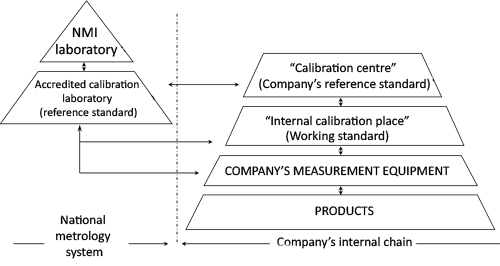Metrological traceability requires an unbroken chain of calibrations from a specific measurement to a measurement unit of the International System of Units (SI).
The task of the National Metrology Institute, NMI, is the implementation of the national measurement standards system and realisation of the SI units. In Finland, VTT MIKES acts as the National Metrology Institute, NMI. With the help of calibrations, the traceability of measurement standards is transferred from NMIs via accredited calibration laboratories to the measurement equipment of various operators. These calibrations form a so-called chain of comparisons.
A condition for the realisation of metrological traceability is an unbroken chain of comparisons reaching to the SI unit. In each phase of the chain, the following is realised:
- All parts of the chain have a calibration certificate
- Measurement uncertainty is known and notified
- Calibrations are performed in a competent manner
- Measurement methods and results have been documented
- Equipment can be identified
- Re-calibrations are performed at specific intervals
The metrological traceability of measurement results is vital for ensuring the reliability of results obtained by accredited laboratories and inspection bodies. In order for the traceability requirements of accreditation standards to be applied in a harmonised manner, ILAC (International Laboratory Accreditation Cooperation) has published a policy called
ILAC P10:07/2020 ILAC Policy on Metrological Traceability of Measurement Results (download pdf).

Caption: A traceability triangle describes the transfer of traceability from an SI measurement unit to the measuring result. In each phase, the measurement uncertainty increases.